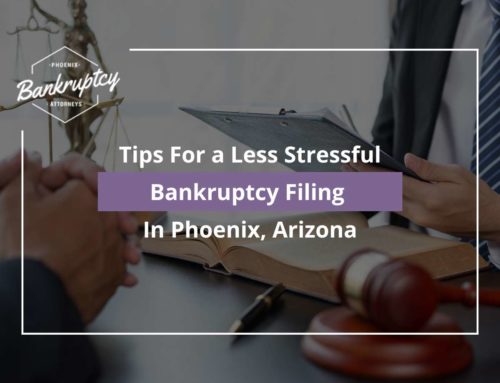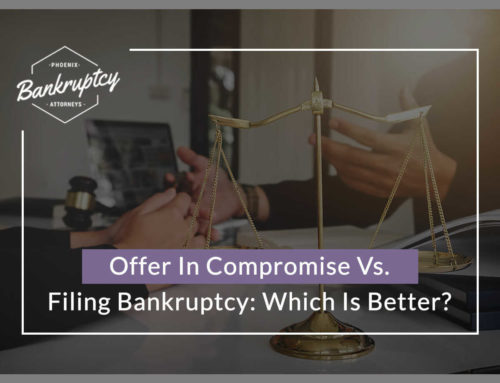Our Phoenix Bankruptcy Lawyers Take a Look At Family Member’s Credit Card Debt
Debt collectors use clever and creative ways to collect on bills, but they aren’t always the most scrupulous methods. Sometimes, debt collectors will realize in advance that a debtor is never going to pay off their balance, and attempt to get a family member to settle the debt instead. But debt collectors need to abide by certain laws that make debt collection more clear and honest, and are only entitled to collection from family members in limited circumstances. If you have a loved one who struggles with debts, and you are concerned about being held liable for them, read on to learn more about when you might be forced to pay your relative’s debts.

Divorce Property Division
Arizona is a community property state, which means that everything acquired during the marriage- both assets and debts- are part of the marital estate. Should the spouses ever divorce, the marital estate will be split equally between them during a part of the divorce process called property division. However, this is just how the judge will rule if the divorce goes to trial. The spouses can agree to a property division that isn’t consistent with community property out of court, or even before the marriage in a prenuptial agreement.
In some cases, if a spouse wants to keep an asset like a vehicle or house, they may need to agree to take on their spouse’s share of credit card debts. This may even mean taking on a spouse’s separate property debt. If you know that debt will be an issue in an upcoming divorce, it’s vital that you understand what is and isn’t community property, as well as the approximate value of all of your assets. You should also inform yourself about marital waste, or when one spouse purposely excessively spends and maxes out credit cards in the wake of a divorce filing. You should review any property division agreements with a family law attorney so that you fully understand what you are signing.
Authorized User On Credit Card Accounts
Being added as an authorized user on someone’s credit card can be a great way to increase your available revolving credit and improve your credit score. Whether you do it for your child as they enter adulthood, for a relative who needs to boost their credit after bankruptcy, or add someone as an authorized user on your credit card for some other reason, it can end up costing you. You may want to consider immediately confiscating their card for the account, if they are truly only meant to have the account reflected on their credit report. Otherwise, your authorized user could max out your spending limit, leaving you liable to pay off the balance. If you do let your authorized user have access to a card, you should regularly monitor spending on that account to make sure your authorized user isn’t abusing the privilege. It is better to detect this situation early on before it gets out of hand, and you are left with an insurmountable credit card bill.
Can My Relatives Pass On Their Debt To Me When They Pass Away?
In the case of parents or other relatives who are older than you, you may be concerned that their debts could be passed down to you after their deaths. The good news is that you can’t exactly inherit debt. If you were on the account with the decedent as a joint borrower, then you could be held liable for those debts after your co-borrower’s passing. Otherwise, your creditors won’t be able to pursue you for your relative’s debts, including if you were an authorized user on one of their accounts. They will need to file a claim for their debts through probate. Once the estate has been settled, creditors are too late to collect compensation for the decedent’s debts.
Can I Use Bankruptcy If I Have Been Left With a Family Member’s Debts?
There are several ways that you can effectively legally agree to take financial responsibility should your loved one be unable to pay their debts. These can also be debts besides credit cards- for example, you could be left with a deficiency balance if you co-sign on a loved one’s auto loan and their car is later repossessed. You could also sign as a guarantor for a relative’s lease who is later unable to pay rent and co-sign on several other types of lines of credit.
Even if you technically agreed to take on financial liability for a loved one, you may have not actually expected and planned for taking on that kind of debt. So what solutions are available to you if you end up with a relative’s credit cards and other types of debts? You may be able to negotiate some type of reduced balance with the creditor, or work out an alternative payment plan that allows you to pay off the balance in affordable installments. You can retain an attorney especially for this process, known as debt settlement. Keep in mind that it can negatively impact your credit if you pay off a debt for less than its full balance.
The good news is that most of the debts you could be left with by a loved one, including credit card bills, are unsecured debts. These are debts that don’t have an asset secured to them as collateral, like a home mortgage or an auto loan. Unsecured debts without priority status are typically dischargeable in bankruptcy. You may qualify to clear unsecured debts in Chapter 7 bankruptcy, and if not, may be eligible to discharge your unsecured debts with a reorganized payment plan through Chapter 13 bankruptcy instead. You will be protected from creditors by the Automatic Stay throughout the process, and can erase other debts with which you may be struggling.
Contact Our Phoenix Bankruptcy Lawyers for Assistance
Our skilled Phoenix Bankruptcy Lawyers offer free case evaluations, so you can see which chapters you qualify for, and if you’re eligible for our Zero Down payment plan option. Contact us or use our online form to speak with a member of our experienced bankruptcy team today. Our Phoenix Debt Relief Team offers free consultations and years of experience in filing bankruptcy in Maricopa County.
PHOENIX BANKRUPTCY ATTORNEYS





